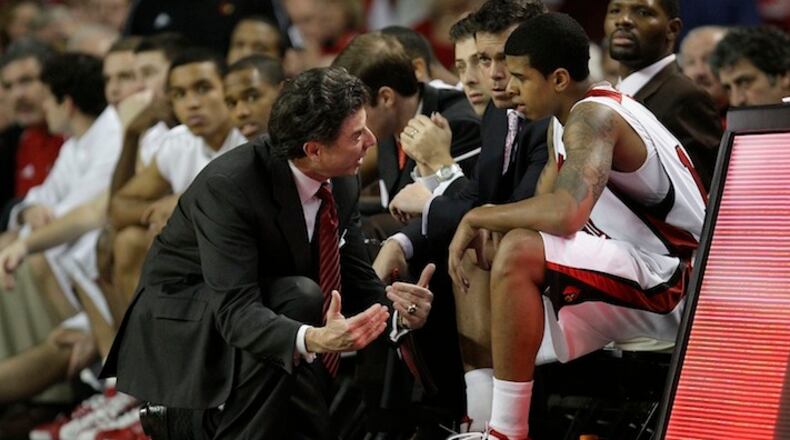Barely a month later, Jurich is out as the Cardinals' athletic director. Also out is Hall of Fame basketball coach Rick Pitino. Both have been placed on administrative leave, the school announced Wednesday.
Louisville has been caught up in a college sports scandal of immense, troubling proportions. In the Cardinals' case, adidas money allegedly was funneled to a five-star basketball recruit, Brian Bowen, a former N.C. State target who surprised many recruiting analysts this year by picking Louisville.
The national scope of a federal investigation into two schemes has resulted in charges against 10 men. One scheme involves four assistant college basketball coaches allegedly bribing players to play for certain schools, then signing with certain agents once the players turn pro. In the other scheme, a top adidas executive, Jim Gatto, is accused of bribing college recruits to play for adidas schools. It also has raised the question about the financial association between schools and sportswear companies.
Colleges have long been tied to the athletic apparel companies, whether it was Nike, Reebok or adidas, and the more recent big player in the sportswear game, Under Armour. It's a lucrative, symbiotic relationship, providing a college's sports teams with apparel as well as marketing opportunities and merchandise royalties.
It's also lucrative for some of college sports' most high-profile coaches. Pitino, for example, has received $1.5 million a year from adidas, according to USA Today.
Louisville's new deal with adidas, which has a $16 million per-year value and runs from 2019-28, is the richest in the ACC but is not the best in college athletics. UCLA makes $18.7 million a year from Under Armour, and Ohio State makes $16.7 million a year from Nike.
N.C. State and Miami also have adidas contracts and Georgia Tech has signed an agreement with adidas that begins in 2018. Nine ACC schools are affiliated with Nike, including Duke, North Carolina and Wake Forest.
UNC is in negotiations with Nike on a new multi-year contract. The Tar Heels are being paid $3.55 million a year under the current 10-year deal, and UNC basketball coach Roy Williams also is paid by the company. How much is not known.
The benefits seemingly are mutual for school and company in apparel deals. Both use the other's brand, the college athletes becoming moving billboards for the company and its gear, and the schools receiving new, quality sportswear and revenue.
Georgia Tech athletic director Todd Stansbury, in announcing the deal with adidas, said it would "provide our student-athletes and fans with the most cutting-edge athletic gear in the marketplace and amplify the Georgia Tech athletics brand."
Sonny Vaccaro is the man often credited — or blamed — for beginning the sportswear arms race and company rivalries. While working for Nike co-founder and chairman Phil Knight, Vaccaro pursued some of college basketball's best coaches and offered "shoe deals" in the 1980s and '90s.
The list of Nike coaches began to grow: N.C. State's Jim Valvano, Jerry Tarkanian at UNLV.
And Mike Krzyzewski. The Duke coach became a Nike coach in 1993 as the Blue Devils stopped wearing adidas basketball shoes.
Vaccaro once ran summer basketball camps, inviting the coaches affiliated with Nike to scout and mingle with prospects. When some of the best players at those camps later attended schools with Nike sponsorships, Vaccaro was the one criticized as steering players to those schools.
Vaccaro is said to be the one who convinced Michael Jordan to sign his first Nike contract out of UNC — which Jordan has disputed. Jordan carried the Nike brand in a large way, his Jumpman logo becoming universally recognized and is now on UNC football uniforms this season as part of the Jordan Brand.
Vaccaro made another move in the late 1980s, signing Miami to a deal to put Nike shoes on all the Hurricanes athletes. At the time, Vaccaro famously told Knight, "Now we own the school."
Vaccaro later broke with Nike, leaving for adidas. In the mid 1990s, working for adidas, he had a relationship with Makhtar Ndiaye, who had transferred to UNC in 1995. In November 1996, the NCAA ordered Ndiaye to repay improper benefits he had received from Vaccaro.
While with adidas, Vaccaro hired Gatto, who would later become the company's director of global sports marketing.
On Tuesday, Gatto was one of the 10 men named in the federal investigation and now faces federal corruption charges of bribing two college recruits with payments of $100,000 and $150,000.
"This isn't the NCAA and some school turning somebody in and then having the NCAA take five years to investigate," Vaccaro told Mike Fish of ESPN of the federal investigation. "This is huge."
About the Author
